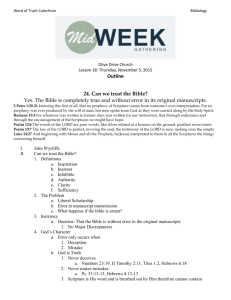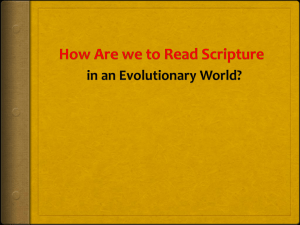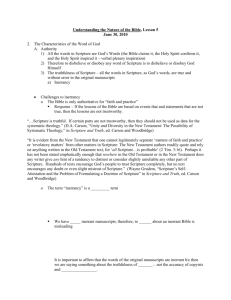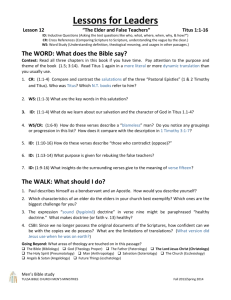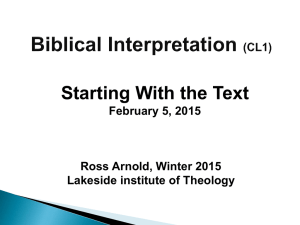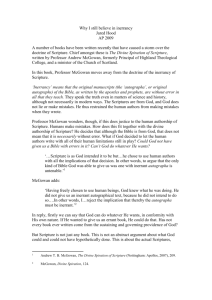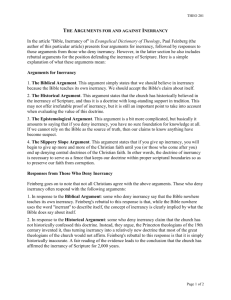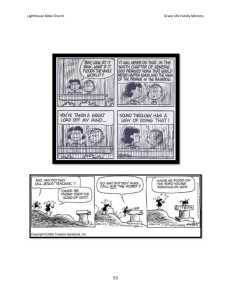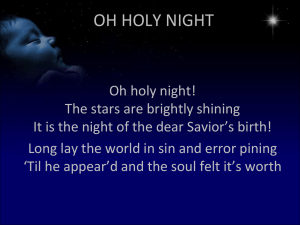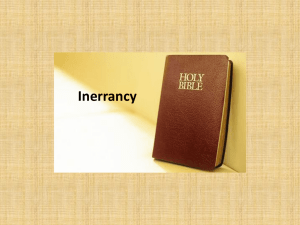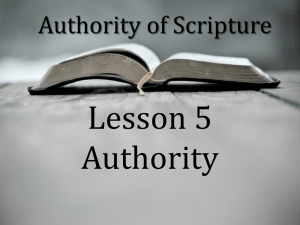Notes - Valleydale Church
advertisement
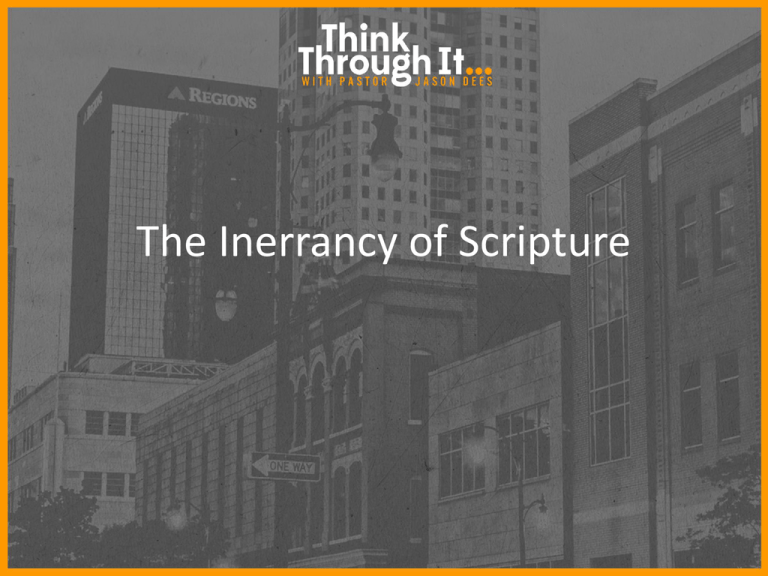
The Inerrancy of Scripture Verbal Plenary Theory Every word in the Bible is exactly the word that the Divine Author intended (the Holy Spirit) and exactly the word that the human author intended . Compatibilist View In God’s divine providence the life, taste, education, experiences, and research of the Biblical authors in conjunction or compatible with the direct inspiration of the Holy Spirit gave us God’s words, the Bible. Can we trust the Bible? The Chicago Statement on Biblical Inerrancy (1/5) God, who is Himself Truth and speaks truth only, has inspired Holy Scripture in order thereby to reveal Himself to lost mankind through Jesus Christ as Creator and Lord, Redeemer and Judge. Holy Scripture is God's witness to Himself. The Chicago Statement on Biblical Inerrancy (2/5) Holy Scripture, being God's own Word, written by men prepared and superintended by His Spirit, is of infallible divine authority in all matters upon which it touches: it is to be believed, as God's instruction, in all that it affirms, obeyed, as God's command, in all that it requires; embraced, as God's pledge, in all that it promises. The Chicago Statement on Biblical Inerrancy (3/5) The Holy Spirit, Scripture's divine Author, both authenticates it to us by His inward witness and opens our minds to understand its meaning. The Chicago Statement on Biblical Inerrancy (4/5) Being wholly and verbally God-given, Scripture is without error or fault in all its teaching, no less in what it states about God's acts in creation, about the events of world history, and about its own literary origins under God, than in its witness to God's saving grace in individual lives. The Chicago Statement on Biblical Inerrancy (5/5) The authority of Scripture is inescapably impaired if this total divine inerrancy is in any way limited or disregarded, or made relative to a view of truth contrary to the Bible's own; and such lapses bring serious loss to both the individual and the Church. The Holy Bible was written by men divinely inspired and is the record of Gods revelation of Himself to man. It is a perfect treasure of divine instruction. It has God for its author, salvation for its end, and truth, without any mixture of error, for its matter. The Holy Bible was written by men divinely inspired and is God's revelation of Himself to man. It is a perfect treasure of divine instruction. It has God for its author, salvation for its end, and truth, without any mixture of error, for its matter. Therefore, all Scripture is totally true and trustworthy. Wayne Grudem on Inerrancy: The inerrancy of Scripture means that Scripture in the original manuscripts does not affirm anything that is contrary to fact. David Dockery on Inerrancy Inerrancy is the idea that when all the facts are known, the Bible (in its autographs, that is, the original documents), properly interpreted in the light of the culture and the means of communication that had developed by the time of its composition, is completely true in all that it affirms, to the degree of precision intended by the author’s purpose, in all matters relating to God and His creation. Biblical Manuscript Facts • 5,686 Ancient Greek manuscript copies for the New Testament – Plato? Only 7 manuscripts, the nearest only 1200 years away from the original. – Aristotle? 49 manuscript, the nearest 1400 years away from the original. – Julius Caesar? 10 copies, the earliest being 1000 years after he lived. Manuscript Facts Cont’d • The internal consistency of the New Testament: The NT is 96-99.5% textually pure in the manuscript copy tradition. • There are over 19,000 translated copies of the New Testament in Syriac, Latin, Coptic, and Aramaic. John Warrick Montgomery If we disregard the NT all other ancient history must also be seen unreliable. • Perspectives – Matt. 27:3-4 – Acts 1:18-19 • Story Differences – Matthew 20 – Mark 10 • Time – John 2 – Matthew 21 Issues Issues • Genealogies • Proximity – Luke 24:50 – Acts 1:4 • Anachronism – Genesis 11:31 • Location – Mark 5:1 • Theological – Paul and James? Is Jesus Just a Myth? • No – Too Early – Too Counterproductive – Too Detailed in Form “I have been reading poems, legends, myths, and vision literature all of my life. I know what they are like. I know none of them are like this.” C.S. Lewis Next Week: The Attributes of God Grudem: Part 2, Chapters 9-13 Other Recommended Books: A.W. Tozer: Knowledge of the Holy
